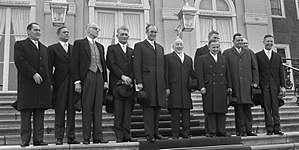Netherlands cabinet De Jong
| De Jong cabinet | |
|---|---|
|
52nd cabinet of the Netherlands |
|

The installation of the De Jong cabinet on 5 April 1967
|
|
| Date formed | 5 April 1967 |
| Date dissolved | 6 June 1971 |
| People and organisations | |
| Head of government | Piet de Jong |
| Deputy head of government |
Johan Witteveen Joop Bakker |
| Head of state | Queen Juliana |
| No. of ministers | 14 |
| Ministers removed (Death/resignation/dismissal) |
1 |
| Total no. of ministers | 15 |
| Member party |
Catholic People's Party (KVP) People's Party for Freedom and Democracy (VVD) Anti-Revolutionary Party (ARP) Christian Historical Union (CHU) |
| Status in legislature | Majority government |
| Opposition party | Labour Party |
| Opposition leader | Joop den Uyl |
| History | |
| Election(s) | Dutch general election, 1967 |
| Outgoing election | Dutch general election, 1971 |
| Legislature term(s) | 1967–71 |
| Incoming formation | 1967 Dutch cabinet formation |
| Outgoing formation | 1971 Dutch cabinet formation |
| Predecessor | Zijlstra cabinet |
| Successor | First Biesheuvel cabinet |
The De Jong cabinet was the executive branch of the Dutch government from 5 April 1967 until 6 June 1971. The cabinet was formed by the political parties Catholic People's Party (KVP), People's Party for Freedom and Democracy (VVD), Anti-Revolutionary Party (ARP) and the Christian Historical Union (CHU) after the Dutch general election of 1967. The cabinet was a majority cabinet in the House of Representatives.
It was the first Cabinet of the Netherlands after World War II that completed a full term without any internal conflicts. The cabinet was confronted with a demand for democratic reforms in the society and it decided to democratise colleges and universities after the famous maagdenhuisbezetting. Plans were made to modernise politics by establishing an electoral system with districts or a chosen prime minister, but these plans were not implemented. Meanwhile, a pay pause due to the decision of employers and employees to raise wages was partly revoked after anti-government demonstrations and strikes. The minister of economic affairs, De Block, resigned, officially as a protest against the wage rise in the metal industry, but another reason was his slow reaction to the inflation and rising prices after the introduction of Value added tax. More unrest took shape in demonstrations against the war in Vietnam. Internationally, relations with Indonesia improved, resulting in a visit by president Suharto, which was, however, overshadowed by the occupation of the Indonesian embassy by Moluccans. The Soviet Union invasion in Czechoslovakia was seen as a reason to increase the defence budget.
...
Wikipedia
